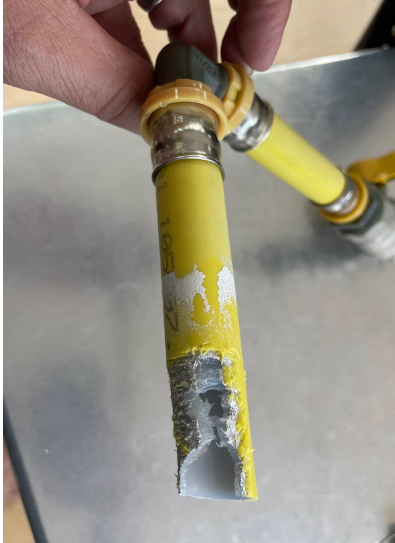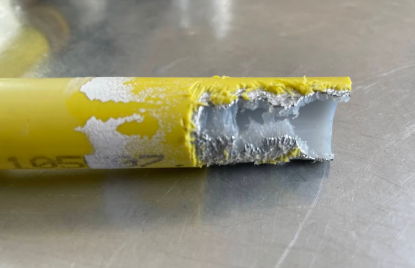Rodent damage to gas pipes is a serious issue that can have potentially dangerous consequences. Rats, mice, and other rodents can cause damage to gas pipes by gnawing on them, which can lead to small holes or cracks in the pipes. These holes can cause gas leaks that can be hazardous to your health and safety.
Rats are known to gnaw on gas pipes for a variety of reasons. One of the main reasons is that rats have constantly growing teeth that need to be kept sharp and trimmed down. Gnawing on hard objects like gas pipes helps to keep their teeth in good condition.
In addition to keeping their teeth in good shape, rats also gnaw on gas pipes for other reasons, such as:
- Access to water: Gas pipes often have condensation on the outside, which can provide rats with a source of water.
- Access to food: Gas pipes can sometimes have traces of natural gas or other substances that rats find appealing.
- Building nests: Rats will often gnaw on gas pipes to create openings that they can use to build nests.
- Navigation: Rats use their teeth to create pathways through solid objects, including gas pipes, to move around more easily.
- Environmental stress: Rats may gnaw on gas pipes due to environmental stressors, such as overcrowding or lack of food, which can cause them to exhibit compulsive behaviours.
Identifying Rodent Damage to Gas Pipes
The first step in preventing rodent damage to gas pipes is identifying the problem. There are a few signs that you can look for to determine if rodents have caused damage to your gas pipes.
First, if you smell gas, it is important to take action immediately. Turn off the gas supply and contact your gas company to report the leak. If you notice any of the following signs, it could be an indication of rodent damage:
- Chew marks or scratches on gas pipes
- Holes in gas pipes
- Gas meter showing a higher usage than normal
- Rodent droppings or nests near gas pipes
Grey Lynn homeowner shocked after rats chew through gas pipes, causing dangerous leak
By Ben Leahy
25 Feb, 2023
An Auckland homeowner says he’s lucky his house didn’t blow up while he was holidaying overseas after rats chewed through piping, causing a major gas leak.
Now Grey Lynn resident Jeff Blue is calling for changes to regulations governing multi-layer gas pipes – made from a composite of plastics and aluminium – saying it’s a matter of time until someone is hurt or dies.
Pipe manufacturer Reliance Worldwide Corporation (RWC) says its products meet all official standards, while the NZ Plumbers, Drainlayers and Gasfitters Association says it has not heard of many instances of rats chewing through gas pipes.
Blue, however, said a potential explosion was only averted at his home thanks to builders working on the property next door.
They called him early one morning while he was overseas saying they could smell gas coming from his property and needed someone to open the house up as quickly as possible or else they’d have to call the fire brigade.
Blue said so much gas had by that time spilled into his house that had someone lit a spark, the explosion could have spread to nearby homes.
“Not just our house, but probably the surrounding neighbourhood would have been taken out as well,” he said.
While multi-layer pipes (MLPs) have become highly popular in the building industry – especially in new homes – over the last 10-15 years, Blue believed the ability of rats to chew through them made them a “systemic” risk in homes across the country.


He said he called in a plumber and certified gasfitter to check his house after the gas leak.
They cut a series of holes along the gas lines in the wall and ceiling looking for damage before finding a section of RWC-manufactured multi-layer pipe that had been chewed through by rats, Blue claimed.
He contacted RWC about the damage but was unhappy with their response because they did not accept responsibility, instead ruling the leak as being caused by an “act of nature”, he said.
He also replaced all the pipes with copper piping and used a pest controller to eliminate the rats.
Rodents gnawing on gas pipes can pose several serious threats, including:
- Gas leaks: The main danger of rodents gnawing on gas pipes is that they can create small holes or cracks in the pipes that can cause gas leaks. Natural gas is highly flammable and can pose a serious fire hazard if it accumulates in an enclosed space.
- Carbon monoxide poisoning: Rodents can also cause damage to gas pipes that can result in carbon monoxide leaks. Carbon monoxide is a colorless, odorless gas that is poisonous to humans and animals in high concentrations.
- Property damage: In addition to the health and safety risks, rodents can cause significant damage to gas pipes and other structures. Gnawing on gas pipes can cause them to weaken and eventually fail, which can lead to expensive repairs and property damage.
- Increased energy costs: Rodent damage to gas pipes can also cause energy costs to increase. Leaks can cause natural gas to escape, which can result in higher gas bills.
- Pest infestations: Finally, rodents gnawing on gas pipes can attract other pests, such as insects and other rodents, to your property. These pests can cause additional damage and pose health risks of their own.
Regardless of the reason why rats gnaw on gas pipes, it is important to take steps to prevent damage to your gas pipes and to control rodent populations around your property. This can help to prevent gas leaks and other potentially dangerous situations.
We at C Tech Corporation have come up with a viable solution for this problem.
Our product Rodrepel™ is an extremely low toxic, non-hazardous rodent aversive. This product acts through a series of a highly developed intricate mechanism ensuring that rodents are kept away from the target application. Our eco-friendly products do not kill the target species but only repel them.
The products are available in the form of solid masterbatches, liquid concentrate, lacquer, and aerosol sprays.
The masterbatch can be incorporated as a polymer additive in the pipes used for various purposes to make them rodent resistant. The masterbatch can be incorporated in polymeric pipes while they are manufactured.
The metallic pipes can be protected by using our liquid concentrate as a topical application. The liquid concentrate is compatible with all kinds of solvents. The liquid concentrate can be mixed with paints in a pre-determined ratio and painted on the external surfaces of pipes. This will prevent rodents from damaging the pipes. The product available in the form of liquid concentrate can be used along with paints and be applied near the areas where pipes are laid on walls and concrete. The product is compatible with all types of paints and solvents.
Our product in form of lacquer can be used to coat the metal and polymeric pipes used for different purposes. The lacquer is a transparent product and it does not wear off easily. It can be applied to already installed metal and polymeric pipes.
Our Rodrepel™ Rodent Repellent Spray is a very handy product. It can be sprayed on any surface to prevent rodents from infesting there. This product can certainly be purchased by homeowners, restaurant owners and use in their kitchens, around the gas pipes, and other areas to prevent rodent infestation.
These products work on the mechanism of sustainability and green technology and therefore significant in today’s time and date as ecology salvation has become the prime focus.
Overall, the threats of rodents gnawing on gas pipes are serious and can result in significant health and safety risks, property damage, and increased costs. By using our products you can get an effective and long-lasting solution against pest nuisance.
Contact us at technical.marketing@ctechcorporation.com if you’re facing problems with rodents and get the best remedies to combat the pest menace.
Also, visit our websites:
http://www.ctechcorporation.com/
http://www.rodrepel.com/
http://www.termirepel.com/
http://www.combirepel.com/
Follow our Facebook pages at:
1] https://www.facebook.com/Combirepel-411710912249274/
2] https://www.facebook.com/Termirepel-104225413091251/
3] https://www.facebook.com/Rodrepel-120734974768048/
Follow us on our Twitter pages at:
1] https://twitter.com/rodrepel
2] https://twitter.com/termirepel
3] https://twitter.com/combirepel
